A father was forced to give up work after a bite from ‘Britain’s most dangerous spider’ left him struggling to walk.
Window cleaner Adam Abrehart discovered a bite on his leg after returning home from a run near Shefford, Bedfordshire last month.
Initially just itchy, the bite soon swelled in size and turned black, engulfing his lower leg and forcing him to seek medical help.
The ordeal would ultimately land him in hospital for three days, and keep him out of work for a further week while he healed up at home.
As someone who works outside, Mr Abrehart is all too familiar with noble false widow spiders – and thinks the species is to blame.
He said: ‘I was running near the local river in Shefford, I don’t know exactly where it happened.
‘All I know is that when I finished, I just saw a couple of red dots on my leg and that was it.
‘Over a couple of days it started itching a little bit, and then it went black, and the bite slowly started to get bigger.
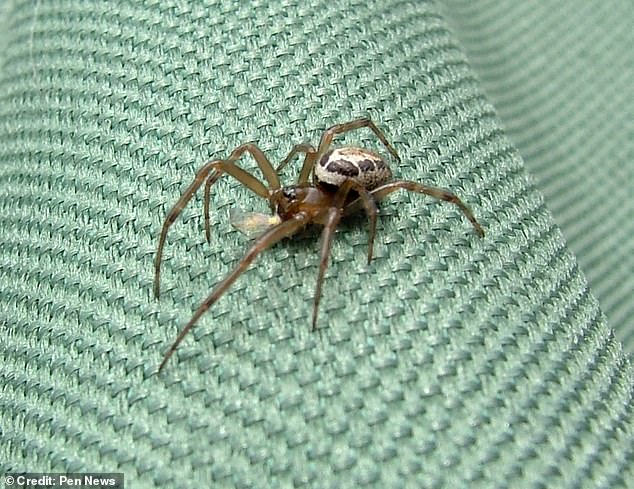
A bite from ‘Britain’s most dangerous spider’ left a man in agonising pain when his leg turned black
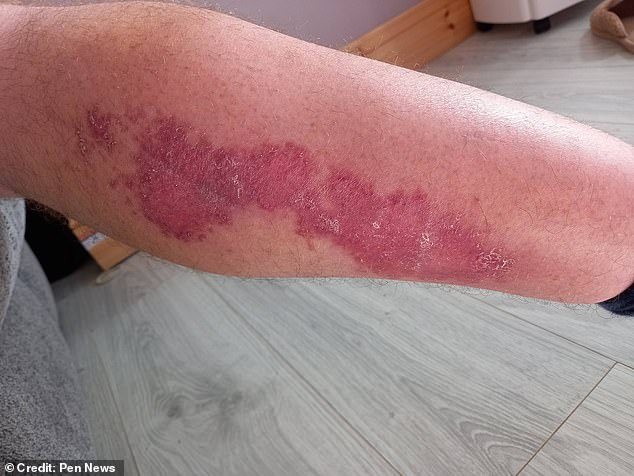
Although the bite looked small to begin with, it began itching and soon a large red area appeared on his leg
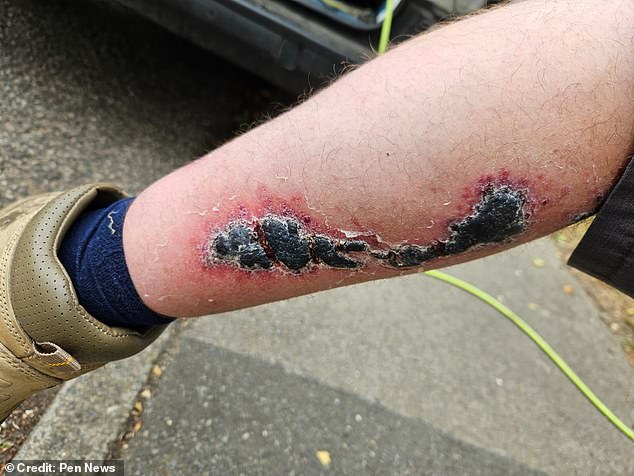
Shortly after, his leg turned black with a huge wound covering the back of his lower legs. Mr Abrehart said it ‘hurt to stand up straight’
‘It went from about two to three millimetres to the size of a pea. Eventually it was about the size of a 20p piece.’
Photos capture the growth of the injury from a small bite to a huge black wound covering his lower leg.
‘When the infection took hold, that’s when the pain started,’Mr Abrehart said.
‘Beforehand it was just itchy, a bit of redness, but then the skin went all black and dark and horrible.
‘I started feeling the swelling and my legs started hurting.
‘I couldn’t walk properly after the infection took over… it really hurt to stand up straight.’
Initially, he contacted the NHS 111 helpline and was advised to get antibiotics.
But it was a Sunday and the pharmacy was closed, so the 34–year–old tried to endure until Monday.
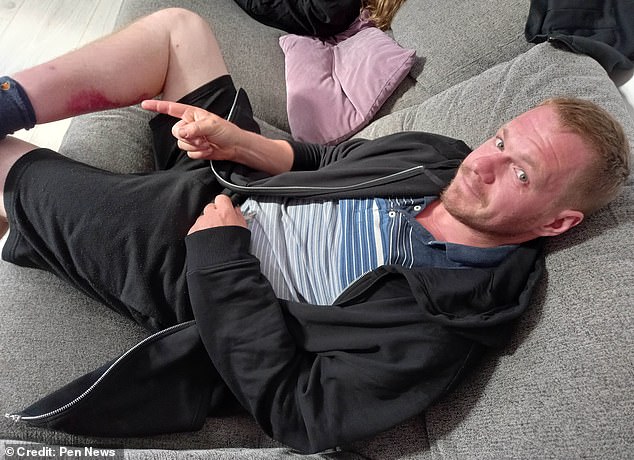
Adam Abrehart said he started to feel really sick, with a bad headache and a temperature, soon after the bite first occurred
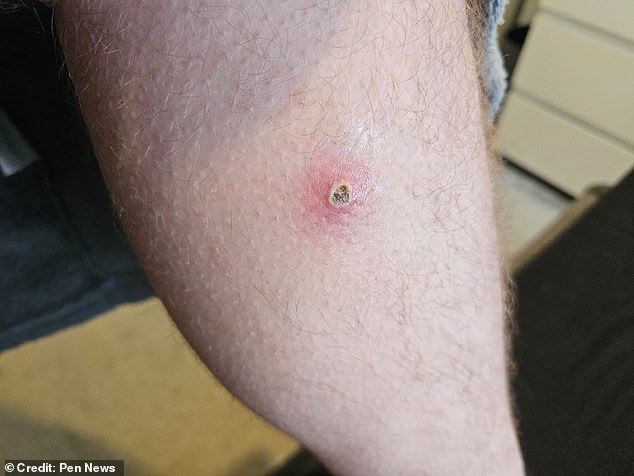
While the bites was only small to begin with, it quickly swelled up and became extremely painful
He said: ‘Throughout the night I suddenly got worse, I started being sick – really sick.
‘I got a really bad headache and could barely open my eyes. I had a temperature as well.’
‘It was just getting too much. I thought it was time to go to the hospital.’
The noble false widow is ‘widely regarded as the most dangerous spider breeding in Britain’, according to a 2020 paper by Clive Hambler, an Oxford University zoologist.
Known as Steatoda nobilis, they’re not native to Britain and are thought to have arrived from the Canary Islands in banana boxes in the late 1800s before slowly spreading northwards.
‘I think I ran through its spider web, and then it didn’t like me very much, so it had me,’ said Mr Abrehart.
At the Lister Hospital in nearby Stevenage, he was put on a drip and admitted as an inpatient.
He was there for three days, before being sent to recover at home for a week.
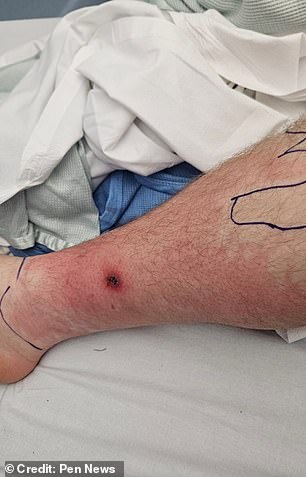
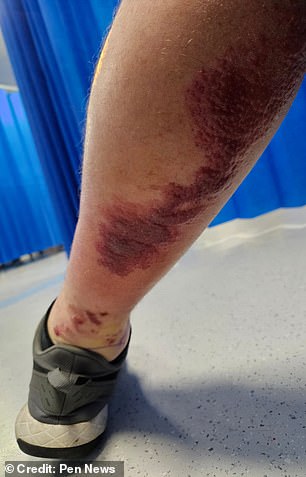
The bite (left) appeared to spread, which prompted Mr Abrehart to go to hospital where he was put on a drip
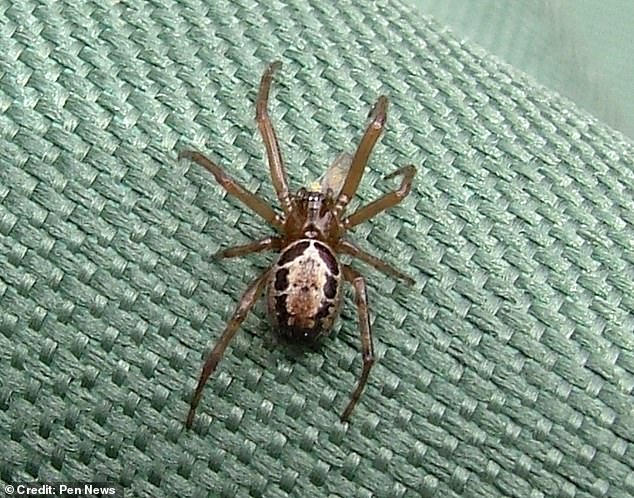
The noble false widow is ‘widely regarded as the most dangerous spider breeding in Britain,’ according to a 2020 paper by Clive Hambler, an Oxford University zoologist
Even now, a month later, he still has angry scars and the bite ‘still hasn’t fully cleared up yet’.
Yet despite the trouble, he bears no ill will towards false widows and urged people to ‘treat spiders with respect’.
The bite of a false widow has been likened to bee or wasp stings, and usually result from handling the spider roughly or from a spider being trapped between clothing and skin.
If you are bitten, experts recommend washing the bite with soap and water, applying a cool compress and taking over–the–counter medication if the bite hurts or is itchy.
If redness, swelling or pain does not subside, or there are signs of infection, call the 111 helpline.












